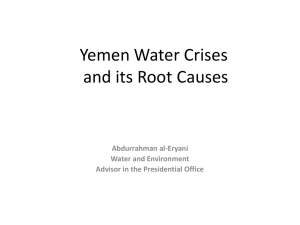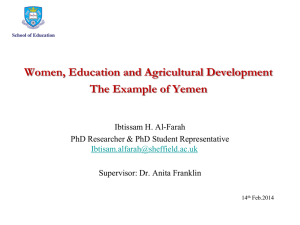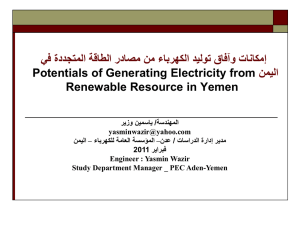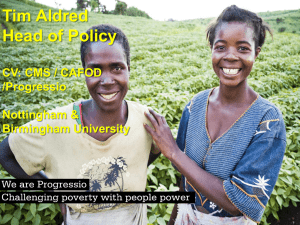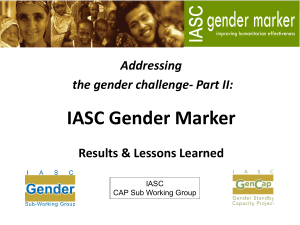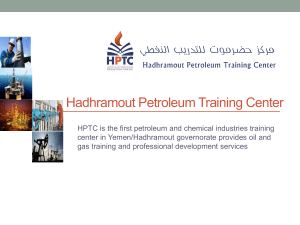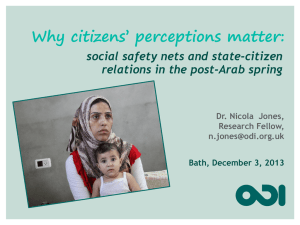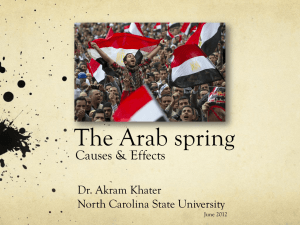Multi-Annual Strategic Plan Yemen 2014 - 2017
advertisement
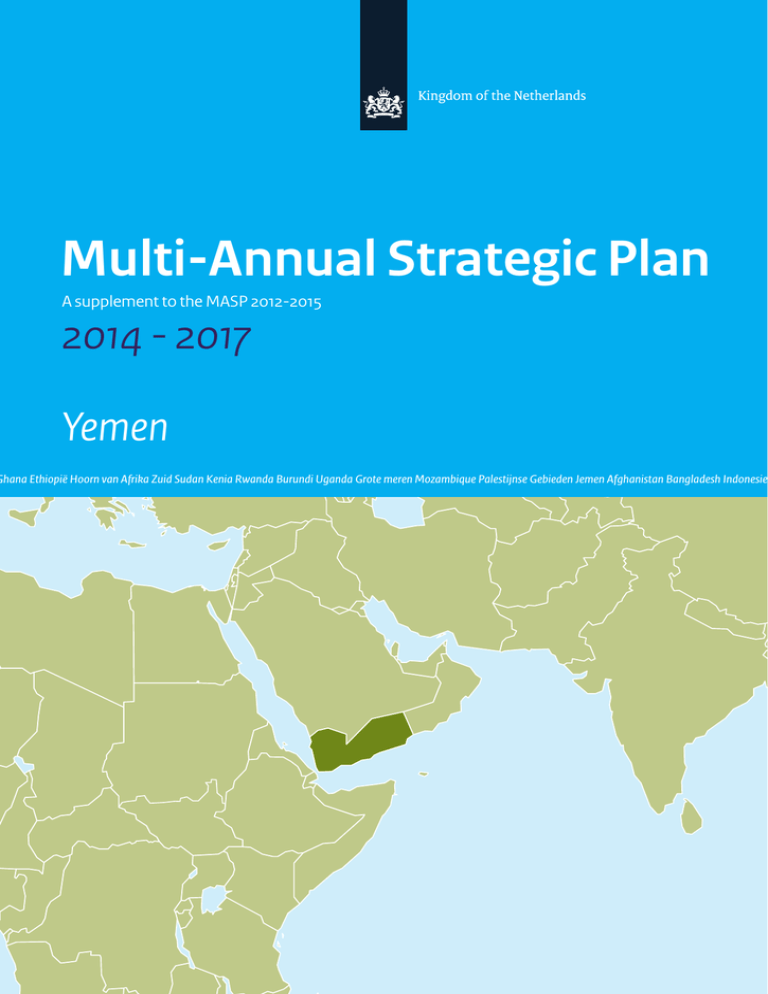
Multi-Annual Strategic Plan A supplement to the MASP 2012-2015 2014 - 2017 Yemen Ghana Ethiopië Hoorn van Afrika Zuid Sudan Kenia Rwanda Burundi Uganda Grote meren Mozambique Palestijnse Gebieden Jemen Afghanistan Bangladesh Indonesie Multi Annual Strategic Plan Sana’a - Yemen 2014-2017 A supplement to the MASP 2012-2015 Sana’a, October 2013 0 This revised Multi-Annual Strategic Plan (MASP) aims to elaborate the principles laid down in the policy paper "A World to Gain: a new agenda for aid, trade and investments”. The MASP will apply to a period of four years (2014-2017), but interim adjustments can be made in reaction to, for example, major political or other changes, or when improving the alignment of Dutch initiatives with the EU Joint Programming process. Introduction The Multi-Annual Strategic Plan (MASP) 2012 – 2015 is being updated whilst Yemen is facing many uncertainties, mainly as a result of the uncertain outcome of the National Dialogue Conference, to be finalised later in 2013. What seems certain at the moment is that Yemen will become a federal state. How many states will be created and which responsibilities will be transferred to a decentralised level, will most probably become clear during the last months of 2013 and in 2014. After the National Dialogue Conference a new Constitution will be drafted and submitted to a referendum. The referendum on the new constitution, including on the new state structure, and subsequent elections (parliamentary, presidential, local level) are scheduled to take place in 2014. Given these uncertainties and given the fact that the implementation of the MASP 2012-2015 was only taken up slowly in the course of 2012 (after the return to the Embassy of a limited staff complement in early 2012 and the final return to full staffing in early 2013) it was decided to write a MASP ‘light’ for the period 2014-2017. This MASP proposes to continue the implementation of the orientations already agreed in the MASP 2012-2015 and only to present concrete plans for the first period under consideration, i.e. 2014 - 2015. Plans for 2016 and 2017 will be developed depending on the outcomes of the National Dialogue, the referendum and the elections. This MASP light will also indicate what activities are less likely to be affected by the expected changes in state structure and what support may be given to facilitate the transition to the new state and its organisational set-up. Uncertainty is not an exclusive Yemeni phenomenon. In view of severe budget cuts in the Netherlands, it is necessary to cut down on operational costs of the Dutch Embassy in Yemen. It is assumed that over the years 2014 and 2015, the programme - as presented in this MASP ‘light’ - can be implemented, without further budget cuts. By the end of 2014 it will probably be possible to define the programme for 2016 and 2017 with more certainty. An update of this document may be drafted by that time, for instance, when the Embassy of the Kingdom of the Netherlands (EKN) submits its annual plan for 2015. This MASP ‘light’ 2014–2017 therefore updates the existing MASP 2012-2015, in the following three areas: 1) Priorities as selected in the Dutch government policy paper, “A World to Gain”, 2) Budget cuts in general, and those requested by the Ministry of Foreign Affairs, especially those aiming to reduce the operational costs of the Embassy in Sana’a, and 3) The political developments of the last 2 years in Yemen. Politics: weak governance, domestic conflicts, transition with unknown outcomes Yemen is a presidential republic, with Abdu Rabu Mansoor Hadi as the elected president of the Republic of Yemen since February 2012. Hadi was selected as a ‘consensus candidate’ after political parties agreed to a UN/GCC brokered transition plan. This plan led to former President Saleh handing over power to his Vice-President, Hadi, by the end of 2011. This was followed by presidential elections in February 2012 which saw Hadi as the only candidate, and the start of the National Dialogue Conference (NDC) in March 2013. As soon as the Conference has agreed on its final report, a new Constitution will be drawn up. This constitution will then be submitted to a referendum, followed by presidential and parliamentary elections, finally leading to the formation of a new Government. In the 1 original UN/GCC brokered transition agreement the presidential and parliamentary elections in February 2014 would form the final stage of the transition period. However, the time frame has been seriously delayed during implementation of the transition agreement. It is expected that at best these elections will be held by the end of 2014. Political parties and the international community are still preparing the modalities necessary for bridging the gap caused by the delays. Governance in Yemen has always been a challenge. Power has been, and still is, heavily concentrated in the hands of a small ruling elite. This elite have lost some of its power during the unrest of 2011, which was mainly an occurrence of intra-elite fighting. The struggle between factions within the ruling elite (i.e. the Saleh clan versus the Al-Ahmar clan) opened up space for new political players, such as civil society, women and young people. They have capitalised on this opportunity by capturing positions in the NDC and by decisively influencing the debate within the Conference. However, the ruling elite swiftly recognised that infighting would not be in their interest and are now trying to recapture its original exclusive hold on power. At the time of writing, it is unclear just how that struggle will end. The National Dialogue Conference started on 18 March 2013 and has produced a political process that went much better than many observers had expected. This process not only included the traditional political parties, but also previously excluded political players from the North and the South of the country, and new players such as those representing civil society, youth and women. Debates were and still are remarkably lively, but people have been listening to each other. Although some delays have occurred in the last few weeks, mainly in the Working Group on the Southern Issue and the Working Group on State Building, seven out of nine working groups have now presented their final reports. There has been strong support for the process throughout from the UN (mainly by providing technical expertise funded via a multi-donor trust fund, to which the Netherlands has also contributed) as well as from the international community, GCC and others, keeping the right balance between providing support and having a Yemen led process. Development: main needs in Yemen In 2013, 43% of the Yemeni population is still (moderately or severely) food insecure. Over the past two years, the transition government has neither been able to gain the confidence of the population, nor to deliver the basic services the population has been waiting for. Donor support will be indispensable for the immediate future to help stabilise the country. The humanitarian aid funding requirements in 2013 amount to approximately USD 800m, of which slightly more than 43% has been covered by October 2013. The pledges made at the donor conference in September 2012 (USD 8.9bn) are disbursed at an extremely slow pace. The government, together with the donor community, has created an ‘Executive Bureau’ to help accelerate disbursement of the pledges. This Bureau is positioned within the Ministry of Planning and International Cooperation but has an independent status. The main problem for disbursement is that the Government of Yemen (GoY) does not have many wellprepared project proposals that are ready for foreign funding. Of those that are ready, most relate to infrastructure projects. On the whole, project activities funded by the Embassy of the Kingdom of the Netherlands are implemented by UN organisations, NGOs and Dutch agencies. The implementation of the Dutch programme is therefore less dependent on proposal preparation by the GoY. Donor landscape, partners and coordination in Yemen Compared to other countries, Yemen is supported by only a limited group of donors. USAID, DFiD, the EU, KFW/GIZ and the Netherlands are the main bilateral donors. International organisations active in Yemen are: the World Bank and the UN (most visibly the UNDP, WFP, UNICEF, UNHCR and FAO). Apart from this core group, a number of smaller donors are also active in Yemen: - SDC (Switzerland) runs a very small programme focused on migration. 2 - - Japan has suspended its aid efforts due to security constraints for JICA field staff but continues to support projects through multilateral channels (e.g. via the UN Multi-Donor Trust Fund for the NDC). Sweden has no presence in Sana’a, but contributes to international organisations that are primarily focused on human rights and the transition process. EKN has agreed with Sweden that the Netherlands will monitor the performance of the NDC UN Trust Fund - to which both countries are contributors – also on behalf of Sweden. Denmark is represented by a local staff member housed by the EU. The limited programme focuses on human rights and is managed by the Danish Embassy in Amman. Donors from the Gulf have also pledged their considerable support, mainly in the form of soft loans. Coordination with regional donors has made some progress since the GCC representative office was opened in Sana’ a. The GCC is represented in donor coordination meetings, but a difference in approach remains; the focus of regional donors lies mainly in the domain of infrastructure projects (e.g. construction of hospitals). In 2013, the EU started a new worldwide programme cycle. The EU, however, did not think that drafting a new 7 year programme (2014-2020) for Yemen would be feasible in 2013, due to the uncertainties related to the current transition process. Thus, Brussels has granted an exception to the delegation in Sana’a. In 2015, the EU will start a Joint Programming Effort for the coming years in Yemen. A new planning phase will start in 2016. The Joint Programming Process will start off by drafting a Road Map towards joint programming in December 2013. Joint programming, or at least a joint assessment and needs assessment of the political and economic parameters, will commence in 2015. The way forward The above-mentioned context has forced EKN to focus on 2014 and 2015. EKN will implement the priorities, as defined in the MASP 2012-2015, with a subtle change in accents, prompted by “A World to Gain”. For the period beyond 2015, EKN intends to continue with its activities focused on service delivery (sexual and reproductive health services and commodities, drinking water and sanitation). There remains a need for this type of support and continuity of this kind of basic service is rather independent of the transition to a new state structure and delegation of responsibilities. Depending on the choices made by the Ministry in The Hague with regard to operational budget cuts, the details for the implementing modalities and priorities for 2016/17 can be elaborated in 2015, in conjunction with the EU Joint Programming Process. Adjustments to the MASP for 2014 and 2015 The strategic goal of the EKN effort in Yemen remains unchanged: to contribute to human security and development (in particular for women and young people) and to stronger state-society relationships as preconditions for long-term stability. This has the following implications for the EKN approach to development: a) To continue implementing a politically informed overall strategy, reviewing programmes supported by EKN for their conflict sensitivity and contribution to inclusive state-society relationships; b) Ensuring concerted efforts are made towards a joint political dialogue with the GoY; c) Finding the balance between support for system reforms within the sectors and direct support for human security and livelihoods; d) Maintaining a strong focus on tangible results for people; e) Targeting broadened networks, including non-state actors and multiple channels for financial support. Further adjustments will be made to the Dutch approach in Yemen as a result of the priorities selected in the policy note “A World to Gain”: 3 1) Stronger focus on gender and integrating gender more solidly in the approach towards the different themes. EKN wants to provide continued support for enhancing the role of women in Yemeni society. Support of this type will be realised both on a political level and through the funding of activities aimed at enhancing capacities, as well as by implementing Agenda 1325. 2) A more prominent role for the Dutch private sector. EKN will take a careful approach in this field. The security situation remains extremely fragile and the risk of kidnap is still extremely high. EKN cannot take responsibility for the security of Dutch companies, NGOs or agencies during their work in Yemen. Active promotion of Dutch trade and investment will only be feasible when the security situation improves. Furthermore, EKN would not want to risk having to discontinue project activities as a result of increased insecurity and withdrawal of NL experts from projects and programmes. Security and Rule of Law: The final report of the National Dialogue Conference will include recommendations focusing on the Rule of Law, Security and state building. A restructuring of the state to a federal state is highly likely, probably leading to a further demand for donor expertise and contributions (extending the work done by the UNDPA during the NDC funded by a Multi-Donor Trust Fund). Restructuring of the state (with delegated powers to state/regional level) will require substantial donor support by: (1) Building capacity at local level, to meet the demands of the population, and (2) Developing an adequate system for financial management with checks and balances at local level. It is very likely that the Yemeni government will request donor support and that joint donor efforts facilitated by a Multi-Donor Trust Fund will need to be set up. The new constitution, the referendum and the planned elections in 2014 will trigger enhanced citizens’ engagement. In this respect, EKN wants to support awareness raising and engagements through civil society. In order to facilitate the further development of the Rule of Law programme, two missions will be taking place in November 2013. Whilst the first mission will carry out a needs and satisfaction survey regarding the judiciary, another will be performing a political economy analysis of Yemen’s judicial system. Both surveys will provide EKN (and other donors) with a better understanding of the needs and the requirements that exist in the judiciary, as a result of which priorities for providing support in the short and longer term can be set. The role of women and youth and their access to justice will form a prominent feature of these two surveys. In anticipation of the results of these missions, EKN will respond to support requests in the field of Rule of Law and the improvement of citizenship. One of these activities will be supporting the UNDP with a civil society oriented approach to transitional justice. Improved security is of immense importance to the country and to the region. Recently, the International Centre for Counter Terrorism (ICCT), in close cooperation with the Yemeni government, made an analysis of the causes of radicalisation in order to formulate action points for further policy development. The report will be presented in November 2013. EKN aims to develop further orientations for support in this field based on the report’s findings and recommendations. On the subject of Human Rights, the Yemeni Cabinet has approved the creation of an Independent Institute of Human Rights. The law on the establishment of the Institute is expected to pass through Parliament as well. This Institute will need support. Reforms within the Ministry of Interior, the military and the police will also have implications for the institutions related to them and require a citizens’, gender- and human rights-based approach, codes of conduct, rules and regulations. EKN would like to support this process as a central part of the Rule of Law programme. 4 Water In previous years efforts have been made to stimulate more effective sustainable water resource management through better planning and prioritising on the basis of recent, reliable data. The result of these efforts will materialise by the end of 2013; the 4-year Open Database Platform Programme on irrigation for Yemen will be implemented by a Dutch-Yemeni consortium (with Alterra Wageningen UR in the lead). During the preparation of this programme, EKN has worked hard to create a broad national consensus, which has resulted in the support of all relevant (water) stakeholders for the programme (i.e. central government, main water users, universities, other water institutions, and other donors). The embassy is actively following developments in the negotiations on the new constitution and will aim to respond adequately to any new situation arising from it, especially with regard to the possible federalisation of Yemen and the organisation of water resource management at federal or lower level. Should the central state want to delegate the water resources management to a lower level of government, adjustments may need to be made to the EKN Water Programme to involve these lower levels too. The Alterra-programme is flexible enough to allow for such a response by virtue of the different interfaces for data analysis that are to be developed. Furthermore, preparations have been made for the implementation of the Sana’a Basin sustainable water resource management programme. As a possible implementing organisation in this programme, the FAO has a chance to play a prominent role in the process of integrated water management in Sana’a Basin. The fact that the FAO has access to the highest political levels in Yemen, as well as to the agricultural sector (which is the most important water user in Yemen), gives EKN the assurance it needs that this complex programme will be implemented adequately. Both the FAO HQ in Rome and its Regional office in Cairo give their full support to the implementation of this programme. With regard to drinking water and sanitation in 2014 - 2015, the focus will lie on funding those activities that aim to increase the access to safe drinking water and sanitation (WASH programme). There is an immense need for the continuation of this programme, not least because of a high level of malnutrition, which is directly related to inadequate drinking water supplies. EKN will start some new activities in this field in 2014. In comparison with the earlier WASH programme (2012-2014), new projects are specifically aimed to emphasise gender roles and the role of youth, as well as potential water conflict situations in some water basins. In addition, the synergy between the Water programme and EKN’s SRHR programme will be explored and, where possible, deployed. Education in the water sector, and in particular vocational training, will be one of the imperatives of the MASP 2014-2017. Under EKN’s leadership, the three current implementing partners of the WASH programme (SFD, ZOA and UNICEF) are in the process of developing an effective method of providing a sustainable drinking water supply. Lessons learned will be incorporated in the new activities. A strong link will be created with integrated sustainable water resource management, especially in order to prevent drinking water schemes from running dry after a few years because of competing and growing demands from the agricultural sector. Drinking water and sanitation projects implemented by different NGOs, SFD and UNICEF are not expected to change dramatically should drinking water responsibilities be delegated to lower levels, as the National Water Resources Authority (NWRA) already has local branches. It has to be emphasised that all activities with regard to the Water programme are directly related to climate change (climate resilience), most importantly those interventions and activities in relation to safeguarding water sources and catchment areas, improving water efficiency and ensuring integrated and sustainable water resource management.The embassy will work on the integration of sustainability pillars by means of a cross-cutting approach applied to all new water activities, with regard to education (vocational training), public awareness related to water scarcity and the re-use of water, the importance of disaster risk reduction (DRR), as well as by applying research and knowledge in the implementation of water projects, etc. Particularly important conditions in the approval process of new activities will be those DRR-elements related to prevention measures and/or mitigation activities and actions. Effective cooperation with GoY at all levels on these matters is an imperative. 5 Sexual and Reproductive Health and Rights (SRHR) The population growth in Yemen is still high. EKN - along with other donors - supports the collection of data on this issue: the Population Housing and Establishment Census 2014, the Yemen Household Budget Survey and the Demographic and Health Survey will provide decision makers with the data needed to measure the impact of interventions aimed at stimulating family planning and reducing maternal mortality. Other projects supported by EKN include activities focused on increasing access to family planning via Marie Stopes International Yemen (MSIY), and by means of a contribution to family planning commodities via UNFPA. These programmes can be extended for the whole new MASP period. Service delivery through MSIY is independent of the form of the state and is an adequate answer to demands from couples for family planning. Awareness, access to information, education and women’s empowerment will continue to be part of the intervention strategy. Unallocated funds for 2014 and 2015 will be used to promote literacy for women because literacy is key to ensuring greater participation of women in society and to enhancing their ability to make choices about family size and the timing of pregnancies. Donors focusing on reproductive health commodity security are limited to the World Bank, KfW, USAID/DELIVER and the Netherlands, despite a broad acceptance in the donor community that the high population growth rate is hampering improvement of per capita income and is increasing the pressure on natural resources such as drinking water. The Netherlands are a respected donor in this field and EKN is able to contribute visibly as a result of the project activities it has supported (e.g. the number of couples provided with modern family planning methods, numbers of trained midwives and the number of functioning emergency obstetric care units). Gender The political role Yemeni women have played in recent years, has taken an enormous step forward. Women are seeking to have their access to power guaranteed by fixing quota for women in different state institutions. Yemeni women have noticed that progress in the position of women in countries such as Egypt, Iraq and Libya, has been pushed back after the revolutions. EKN will support women by funding training activities and providing political and moral support in their efforts to achieve a women’s quota. This fits in very well with the aims of UN Security Council Resolution 1325 (Women in Conflict Areas). Moreover, EKN will focus its efforts on political dialogue, empowerment of women in society, strengthening civil security through police and improving access to justice for women. The embassy will continue supporting NGOs that are active in the fight against sexual and gender-based violence. Additionally, EKN intends to take an integrated approach towards certain themes in order to create synergies. Options for an integrated approach between the themes (water and sanitation /SRHR/gender/RoL) will be explored over the next two years, by for example: Seeking cooperation with the UN on gender-related issues (such as Gender-Based Violence, child marriage, etc.), and, Exploring the possibility of future support to the Dhamar Governorate, in line with Dhamar Reproductive Health needs and Yemeni and Dutch policies in this area (“A World to Gain”). NL private sector involvement Exports from The Netherlands to Yemen are rather limited, but remain stable. There are no Dutch investors active in Yemen, which is a direct result of the political instability and the fragile security situation in the country. Nevertheless, EKN will try - where possible - to involve Dutch government agencies, academic institutions and companies in its activities. The security situation, however, forces EKN to remain modest in its ambitions. As long as the security situation has not improved and the risk of kidnap remains high, opportunities will remain limited, as EKN cannot guarantee the safety of Dutch companies/institutions nor of their employees. EKN does, however, reply to trade inquiries by Yemeni companies that are interested in buying from the Netherlands. 6 Private sector support instruments PUM (a secondment programme of Dutch senior experts abroad) has also reduced its activities in Yemen due to the security situation. In spring 2013, PUM had intended to increase its activity level, but was forced to scale down its plans again as the security situation deteriorated in the second half of 2013. Nonetheless, PUM is keeping Yemen under review and will scale up as soon as conditions allow. Agentschap NL is currently funding 6 PSI (Private Sector Investment programme) projects. Due to the difficult situation for Dutch joint venture partners, Agentschap NL opened its PSI to other joint venture partners. At the moment, Dutch companies are only involved in some supply contracts, but not as investors. The CBI (Dutch Centre for the Promotion of Imports from developing countries) supports a limited number of activities for Yemeni exporters and is supporting Yemen in the development of its export strategy, in collaboration with the International Trade Centre (WTO/UN agency). NICHE (Netherlands Initiative for Capacity development in Higher Education) Currently there are 6 NICHE projects in the implementation phase in Yemen. As these projects were temporarily put on hold (2011-2012), and owing to the negative travel advice, implementation of the programme has been delayed. As a result, a review of the NICHE country programme, planned for 2013, has not yet taken place and it was decided that a desk review (based on the information of the implementers’ meeting of October 2013 and on the annual reports of 2012) would suffice. There are no NICHE projects yet in the Rule of Law sector, although this would be highly desirable. Options for NICHE support to institutions in the judicial sector will be explored. The Netherlands’ bilateral development assistance to Yemen Budget 2014-2017 2.2 3.1 3.2 4.3 Improvements in w ater management, drinking water and sanitation Sexual and reproductive health and rights for all; stopping the spread of HIV/AIDS Equal rights and opportunities for women Developing the rule of law , reconstruction, peacebuilding, strengthening the legitimacy of democratic structures and combating corruption Total 22.460.000 28.600.000 2.988.000 19.200.000 73.248.000 7
